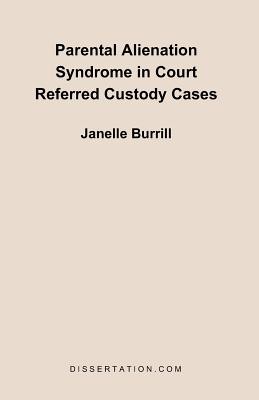
- We will send in 10–14 business days.
- Author: Janelle Burrill
- Publisher: Dissertation.Com. - Do Not Use
- ISBN-10: 1581121490
- ISBN-13: 9781581121490
- Format: 14.2 x 21.4 x 0.6 cm, minkšti viršeliai
- Language: English
- SAVE -10% with code: EXTRA
Parental Alienation Syndrome in Court Referred Custody Cases (e-book) (used book) | bookbook.eu
Reviews
Description
This dissertation summarizes the research of 30 court referred, custody dispute cases assessing the behaviors of the parents and their children to determine the presence or absence of Parental Alienation Syndrome (PAS). The criteria to determine the parent and their children's behaviors is Dr. Gardner's definition of Parental Alienation Syndrome. The parents were placed in three categories (mild, moderate or severe) based on their symptoms and behaviors. Their children (59) were then categorized into three groups (mild, moderate, severe). This investigation seeks to determine additional information regarding the presence or absence of PAS.Reluctance by the courts and mental health community to accept the validity of PAS probably contributes to the perpetuation of the disruption of parent-child relations in custody disputes. Findings and Conclusions: It appears the data from this study corroborates observations and definitions of Parental Alienation Syndrome. The data from this study indicates that the parents in the mild PAS category have children who exhibit fewer negative behaviors toward the alienated parents whereas children whose parents are in the severe category exhibit more negative behaviors towards the alienated parents. This study found that the more negative behaviors a child exhibits towards an alienated parent, the more severe their parent's symptoms and behaviors. Consequently, there is more severe alienation from the alienated parent and the more disruption to that parent-child relation. PAS is a distinctive form of child abuse generally found in intractable custody disputes.
EXTRA 10 % discount with code: EXTRA
The promotion ends in 21d.18:12:45
The discount code is valid when purchasing from 10 €. Discounts do not stack.
- Author: Janelle Burrill
- Publisher: Dissertation.Com. - Do Not Use
- ISBN-10: 1581121490
- ISBN-13: 9781581121490
- Format: 14.2 x 21.4 x 0.6 cm, minkšti viršeliai
- Language: English English
This dissertation summarizes the research of 30 court referred, custody dispute cases assessing the behaviors of the parents and their children to determine the presence or absence of Parental Alienation Syndrome (PAS). The criteria to determine the parent and their children's behaviors is Dr. Gardner's definition of Parental Alienation Syndrome. The parents were placed in three categories (mild, moderate or severe) based on their symptoms and behaviors. Their children (59) were then categorized into three groups (mild, moderate, severe). This investigation seeks to determine additional information regarding the presence or absence of PAS.Reluctance by the courts and mental health community to accept the validity of PAS probably contributes to the perpetuation of the disruption of parent-child relations in custody disputes. Findings and Conclusions: It appears the data from this study corroborates observations and definitions of Parental Alienation Syndrome. The data from this study indicates that the parents in the mild PAS category have children who exhibit fewer negative behaviors toward the alienated parents whereas children whose parents are in the severe category exhibit more negative behaviors towards the alienated parents. This study found that the more negative behaviors a child exhibits towards an alienated parent, the more severe their parent's symptoms and behaviors. Consequently, there is more severe alienation from the alienated parent and the more disruption to that parent-child relation. PAS is a distinctive form of child abuse generally found in intractable custody disputes.


Reviews